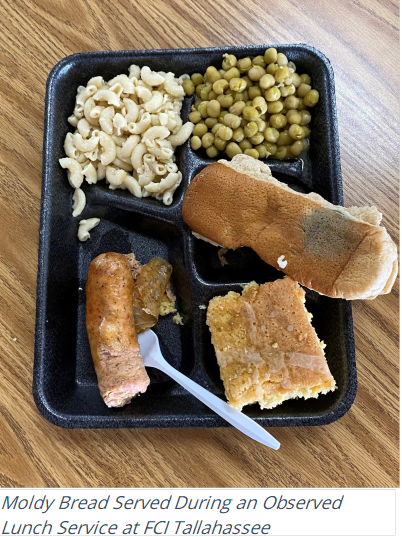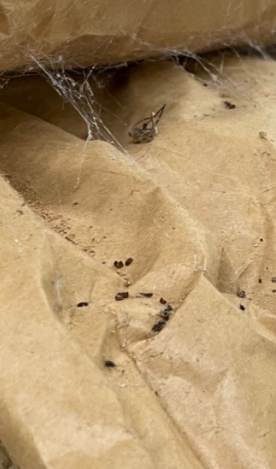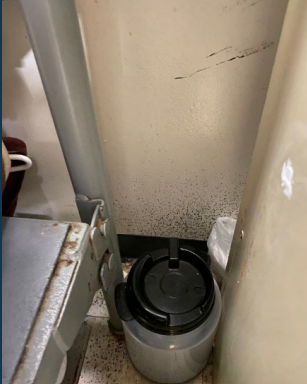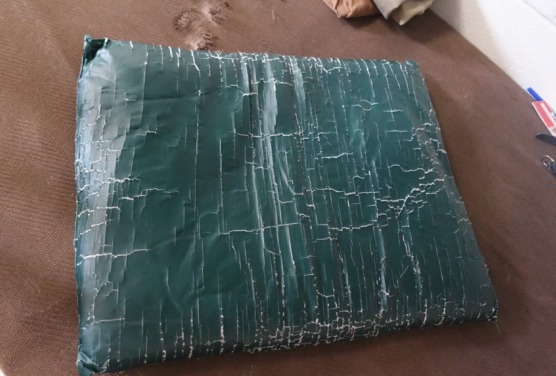Tallahassee federal women's prison in 'alarming' condition, inspectors say
A surprise summer inspection of the federal women's prison in Tallahassee revealed "alarming" conditions, including inmates being served moldy or rotten food and living with "black substances" on walls and ceilings.
Inspectors who visited the Federal Correctional Institution also saw "likely evidence of rodent droppings," spotted leaks in the housing unit roofs, saw rusted storage lockers and worn bedding, and discovered "concerning" staffing shortages.
The U.S. Department of Justice's Office of the Inspector General conducted their "second unannounced inspection" this May 22-26 and released the full 50-page report this week. FCI Tallahassee houses 921 inmates, including Jeffrey Epstein's sex-trafficking accomplice Ghislaine Maxwell.
In a statement, a Federal Bureau of Prisons spokesperson said it is appreciative of the "valuable work" the Office of the Inspector General did: "While no specific recommendations were made, the FBOP will carefully evaluate and implement any necessary corrective actions to ensure that our mission of operating safe, secure, and humane facilities continues to be fulfilled."
More: Sex trafficker Ghislaine Maxwell fears attack after ratting out inmates who tried to extort her

According to inspectors, "serious issues" with food service were found, posing an immediate risk to inmates' health. Rotten food was consistently served, and was stored in areas with rat droppings and insect infestation. Among other findings, there were "bags of cereal with insects in them."
"Within 24 hours of our notification, FCI Tallahassee staff removed large volumes of food from the storage warehouses," the report says.
A inmate survey from last June revealed that more than half of the institution's population said the food quality was poor, and that they are frequently served outdated food, according to the report.
The prison has had no food service administrator for at least two years, the report said, and the current administrator's first day was the day of the inspection.

Sanitary issues extend to inmates' living quarters
Problems weren't just concentrated in the kitchen and cafeteria, but extended into living spaces that inmates call home.
"We found that some inmates in the female prison lived in housing units in which water frequently leaked from ceilings and windows on or near their living spaces," the report said. "We also observed poor conditions inside communal inmate bathrooms."
Cracks and leaks were consistently found throughout the living spaces and bathroom tiles were missing or chipped, leaving sharp, dangerous edges exposed. Feminine products had been used in places to soak up water.
"Black substances" were also growing and collecting in various areas. "According to inmates, in advance of a BOP correctional audit performed just prior to our unannounced visit, staff had painted over the housing unit ceilings that contained the black substance," the report said.

According to the report, mattresses and pillows were extremely worn and had not been replaced because "those goods are accounted for in the same sub-account as are feminine hygiene products, and in recent years the vendor prices for feminine hygiene products have significantly increased."
Inspectors found that the detention center for men, a newer building, suffered similar bedding issues but structural issues were nowhere near the same level of deterioration as the women's.
Inspectors also found that staffing shortages pushed many correctional officers into overtime in both the male and female prisons – the same as in federal prisons across the country and in Florida state prisons.
FCI Tallahassee often assigns non-correctional officer personnel to temporary correctional officer roles to make up for the lack of staff, according to the report.

"We also learned that correctional officers may not be consistently enforcing institutional rules and some correctional officers may use offensive language when interacting with inmates," the report says.
FCI Tallahassee's Correctional Services Department was staffed at 89% at the time of the visit, but the vacancies in correctional officer positions made it difficult to "provide round-the-clock supervision of inmates."
To be sure, "based on interviews with staff and inmates, we found that most FCI Tallahassee staff and inmates felt safe at the institution," the report says. "Notwithstanding these sentiments, we identified serious issues that undermine the institution’s safety and security."
Elena Barrera can be reached at tallahassee.com. Follow her on Twitter @elenabarreraaa.
This article originally appeared on Tallahassee Democrat: Rat droppings, mold found at Florida prison holding Ghislaine Maxwell
